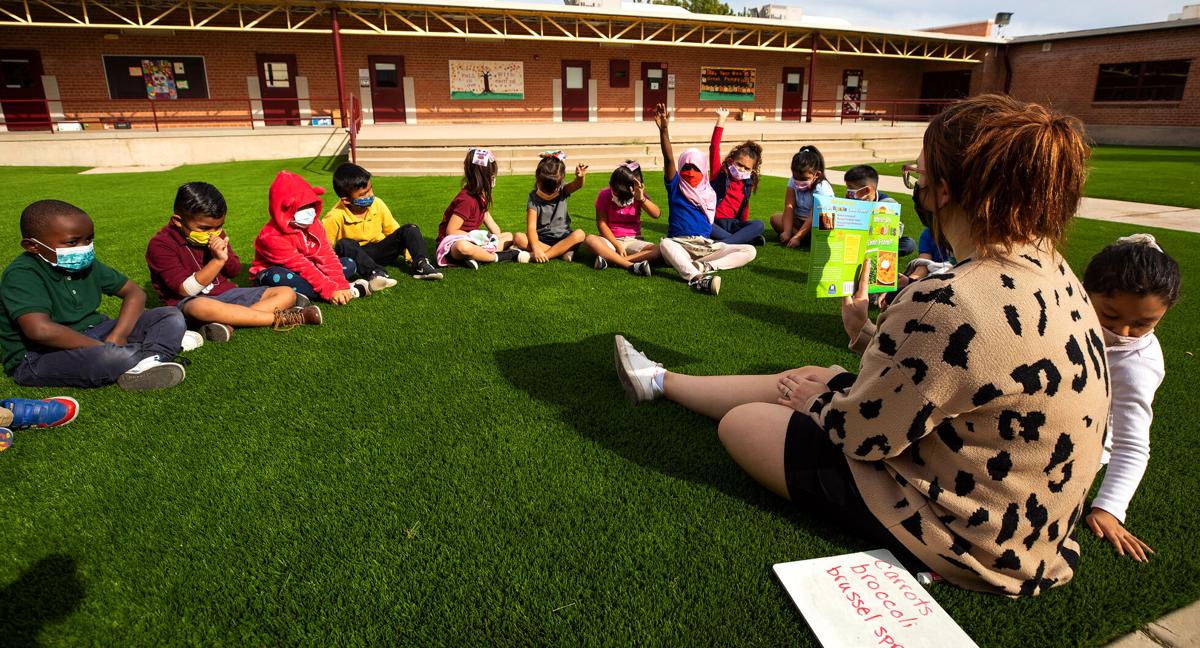For the first time, families enrolled in Tucson Unified School District’s before- and after-school child care programs won’t have to pay for them.
TUSD will fully cover tuition costs for children who receive that care in its Community Schools programs, as well as for district students enrolled in the city’s after-school KIDCO programs, for the 2022-23 school year.
The plan was made possible through funds the district allocated in the year’s budget to help cover those fees, combined with grant funding from the Arizona Department of Economic Security, said Reem Kievit, director of TUSD Community Schools.
About 1,100 families will benefit, and TUSD plans to expand the program.
“This is great news for our community,” said district governing board member Ravi Shah, noting that families are dealing with inflation and cost-of-living increases on top of the expense of child care.
The 11 schools in the Community Schools program are where TUSD offers its before- and after-school care. KIDCO, a program hosted through the Tucson Parks and Recreation Department, offers after-school care only, at 13 sites.
Based on enrollment caps per site and yearly costs per child, Kievit said, tuition coverage for the Community Schools program will cost about $1.08 million and for KIDCO programs, $340,000.
Kievit said the governing board previously voted to allocate $2 million in tuition support for families’ before- and after-school care fees. In addition, the Community Schools program recently received more than $961,000 from DES to also assist with those tuition costs.
The DES grant is not applicable to KIDCO fees and must be spent by September 2023, Kievit said.
Still, after using the DES grant for Community Schools, the remaining costs for TUSD can be covered through the district’s own allocation. Kievit said excess money from the $2 million allocation will be used for materials, supplies, repairs, staffing and recruitment efforts for expansion.
Priority placement for these programs will be given to TUSD employees; those eligible for DES help because of low socioeconomic status; foster kids; refugee students; and students covered by the federal McKinney–Vento Act because they are experiencing homelessness, Kievit told the board.
“This is going to be huge for our employees and families. It’s going to make a really big difference,” TUSD board president Adelita Grijalva said. The board unanimously approved the plan Tuesday.
How much families will save
As it stands now, the cost of KIDCO for an entire school year is $500 per child with a city discount of 25% to 50% on tuition for qualified families, said Community Schools coordinator Andrea Hudson.
She said Community Schools has charged a weekly fee of $75 for children receiving both before- and after-school care, which adds up to more than $2,800 per child for the year.
Weekly costs ranged from $35 to $65 for care only in the mornings or the afternoons. Families that qualify for financial aid through DES saw a lower cost.
The enrollment caps are determined by staffing, and most after-school care sites will have between 40 and 60 slots, Kievit said.
The administration’s goal is to expand the Community Schools program to at least five more sites which have not yet been identified. Those sites will most likely be the schools largely affected by a lack of transportation, she said.
Since expansion is dependent on staffing, the district created and is now hiring for a new employee position that would be shared among several sites, Kievit said.
The employee would help with regular school activities from 10 a.m. to dismissal, then transition into the after-school program until 6 p.m. Kievit noted the new position was created to be more appealing as a full-time job with benefits, rather than a part-time job.
“Expansion is very easy. It’s not the sites, it’s not the materials, it’s not the food, it’s the staffing,” said TUSD Superintendent Gabriel Trujillo. “We’ve created this new position that we hope will create a healthy pool of applicants so we can get expansion underway as quickly as possible.”
Kievit said the long-term “dream” would be to offer free child care at every elementary school.
“I think it would revolutionize child care, what TUSD can offer families. I think it would be huge with recruitment and retention.”
With the cost of infant care exceeding the cost of a year of in-state tuition at the University of Arizona, families struggle to make ends meet.
Find out how some Tucson nonprofits and organizations are working to help families with early learning resources and child care.
Incremental gains to improve student access to mental health professionals on campus have relied on temporary grants rather than permanent funding.








